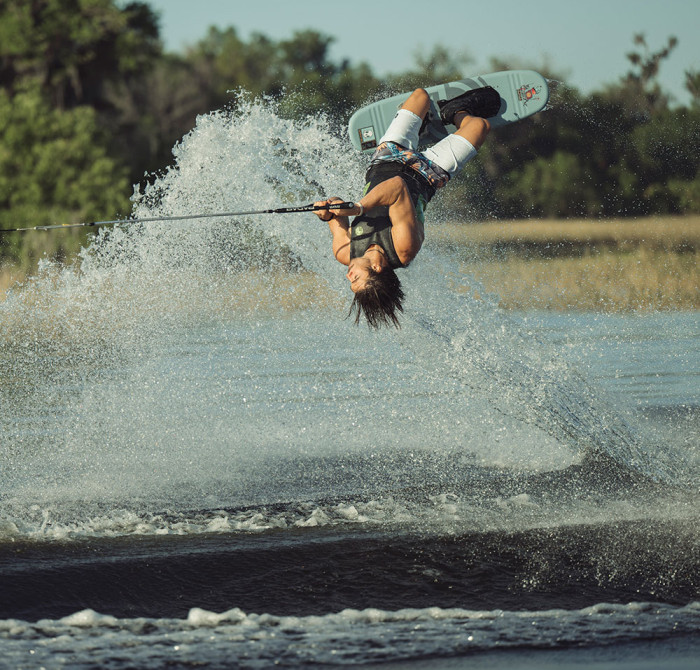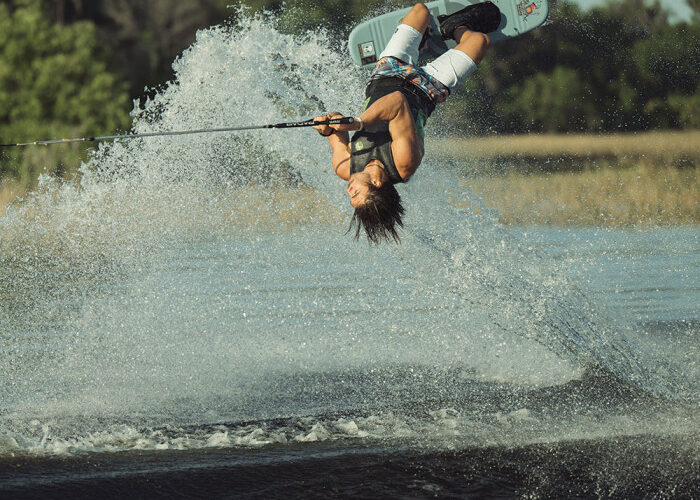IWWF approves four new flips, but their tournament presence looks unlikely

Joel Poland is the most talented person we’ve ever seen ride a waterski, he’s also the weirdest. (image: Radar Skis)
By Jack Burden
The IWWF Water Ski Council has given the green light to four new flips for the upcoming season, potentially infusing the sport with a sense of novelty and innovation. However, despite this approval, one of the creators of these flips is expressing skepticism, stating, “you will never see them in a tournament” at current point values.
1. BFLSLB (“Super Half Twist”)
- Backflip with a ski-line-back
- Submitted by Clarens Lavau
- Approved at 850 points
2. BFLSLO (“Supermobe Front-to-Front” or “UFO”)
- Backflip with a ski-line-360
- Submitted by Joel Poland
- Approved at 900 points
3. RFFLF (“Reverse Half Jack”)
- Frontflip from the back-to-the-front (regular and reverse)
- Submitted by Axel Garcia
- Approved at 850 points
4. FFLSL5F (“Super Front Five” or “Matrix”)
- Frontflip with a ski-line-540 from the back-to-the-front
- Submitted by Joel Poland
- Approved at 950 points
Joel Poland, the architect behind two of these flips, revealed his reservations about the process for assigning point values to new tricks. Both the ‘UFO’ and ‘Matrix’ were successfully executed in 2022, with Poland debating whether it was worthwhile to submit them for approval. In correspondence with the IWWF, he shared, “[I] didn’t feel like it was worth sending them in as the point values would make them another trick on the list we would never see in competition.” Poland remained hopeful, stating, “But I have hope that we can come together and create a point value that makes them worthwhile.”
Upon learning the IWWF-assigned point values, Poland expressed understandable frustration. Regarding the ‘Matrix,’ a frontflip with a 540-degree spin over the rope, he voiced disbelief that it was valued only 150 points more than a regular frontflip. In his words, “The point values for high difficulty flips, in my opinion, are crippling trick and limiting the athletes.”
Poland’s frustration resonates with many top trick skiers and fans, who are in agreement that there is a pressing need for change in the point values assigned to high-end flips.
The most perplexing aspect of this issue is that no one seems opposed to a revision of the trick points in principle. IWWF Water Ski Council Chairman Candido Moz has expressed vocal support in the past for rationalizing trick values. As recently as October, he urged the newly formed Trick Working Group to bring forth proposals for better recognizing “the true difficulty levels” across tricks.
As Freddie Winter highlighted in an insightful Waterski Journal article on the subject, the issue is how to get a consensus on specific changes when each skier, or coach, has a vested interest in elevating the value of tricks they excel at while suppressing the value of those they do not. In the past “the skiers could never agree on point values, so [the] IWWF never received a proposal,” shared Moz.
Instigating change, especially in the face of entrenched interests, is difficult. It may require a new generation to step forward and advocate for reforms. Poland, for his part, remains steadfast. “[I] intend to be very vocal about [point values] in the coming months.”

